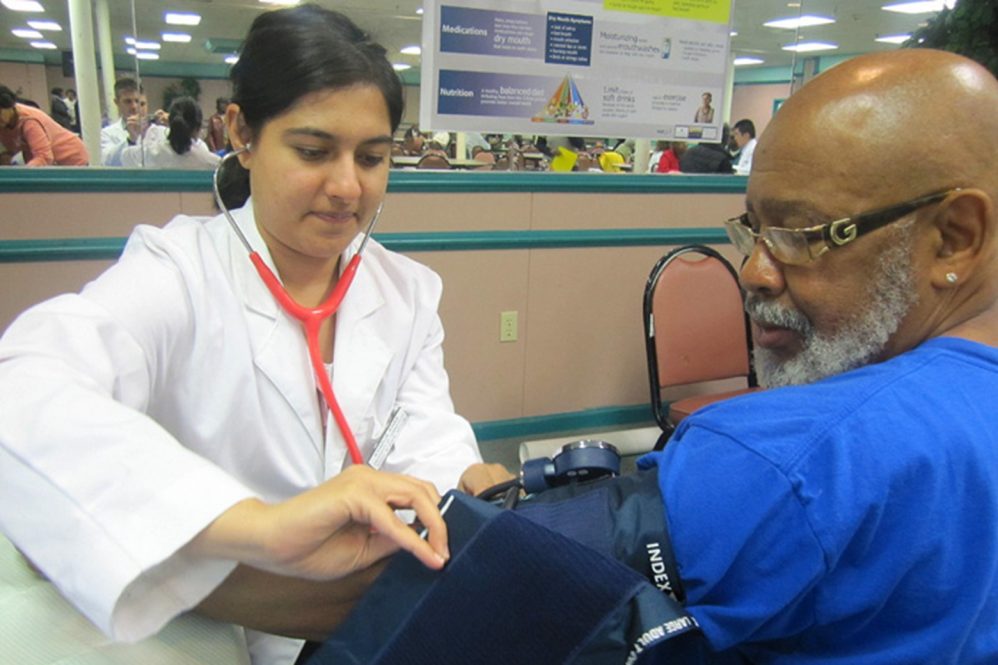If you could design a toolkit for health professions students that would help them understand a patient’s needs beyond the clinical walls, what would you include? Experiential training in the community? Hands-on patient experiences? Interprofessional collaboration? Mentorship?
Of course, the ideal toolkit would include all of the above, and that’s exactly what the Connecticut Area Health Education Center (CT AHEC) based at UConn Health offers to more than 360 Connecticut health professions students annually. The Community Based Experiential Training, or CBET, opportunities are coordinated out of the CT AHEC program office in Farmington on the UConn Health campus and four regional centers.
CT AHEC’s Norwich regional center is now offering UConn health professions students, as well as students from other schools, the opportunity to participate in 36 Inter-professional Education (IPE) Health Clinics this academic year. These free walk-in health clinics are held at food and housing support centers in New London, Norwich, and Willimantic. Under the guidance of licensed clinical preceptors, the clinics provide students with the opportunity to practice basic clinical assessment and communication skills.
“Health care students build their professional toolkits by working with students from other disciplines and getting out in the community and seeing where and how their patients live. Our CBET programs provide them with opportunities to meet patients where they live, work and play,” says Petra Clark-Dufner, director, CT AHEC.
The IPE clinics attract students from dental medicine, medicine, nursing, pharmacy, social work, physician assistant and community health worker programs. In 2024-2025, 155 health profession students participated in the IPE clinics, according to Natalie Crino, program director at the Norwich Health Education Center.
“At the heart of our IPE Program is our shared mission: to improve the lives and health of medically underserved community members,” says Crino. “This is made possible through strong partnerships with key community stakeholders. The IPE clinics ensure students learn how to deliver compassionate and equitable care to those who need it the most under the guidance of knowledgeable health care preceptors.” Students must complete CT AHEC’s online module, Healthcare for Vulnerable Populations, to participate.
Kyle Keegan, a second year UConn medical student and Urban Service Track/AHEC Scholar, said “the IPE clinics provided me with an amazing opportunity to connect with the community, work with peers from various specialties, and learn from both patients and providers outside the hospital setting.”
Keegan said one of his most memorable moments at an IPE clinic was when the preceptor, Dr. Stephen Smith, identified a potentially serious health concern in one of Keegan’s patients. Smith took the time to educate Keegan on the patient’s problem, and the following week the health condition was discussed in class, and Keegan said he was able to connect the experience with the lecture.
“Experiences like this have both strengthened my clinical knowledge and my ability to connect patients to resources in their communities. Overall, the IPE clinics have been a fantastic experience in terms of broadening my medical knowledge and working directly with community partners and patients,” said Keegan.
Community-based health clinics also benefit people in the community, especially those who are not accustomed to personalized attention. Dr. Gary Rhule, a preceptor for the CT AHEC sponsored 2nd Annual Men’s Health Event, told students after the event that “Community participants will always remember how you and your colleagues treated them in a positive way today. And I think your work here today will lay the groundwork for them having better relationships with health care professionals in the future. Well done!”
The IPE Clinics are just one of the many educational opportunities offered by CT AHEC to high school and college students throughout the state.
“CT AHEC’s role in promoting and supporting robust community-based experiential training is critical to the training of tomorrow’s health and public health professionals,” said Clark-Dufner. “With state-wide coverage, the CT AHEC Network brings essential resources to local communities and health profession students in training.”
CT AHEC has trained thousands of health professions students since its inception 28 years ago.
For more information about CT AHEC, please visit h.uconn.edu/ct-ahec.



